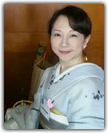Contemprary Tanka Poet Mariko Kitakubo. Tanka Society of America.
My Tanka publicized in Tanka Society of America.
Thank you so so much, Dearest Susan Weaver, Michael L. Harvey!
In particular, I am extremely honored that the editors have kindly included on page 120 an introduction to Tan-Ku's Online Magazine, KIZUNA, a new form of poetry that Deborah P Kolodji and I have invented.
Thank you very much!!
Dearest Kathabela Wilson , Thank you so much for Sending this wonderful issue!
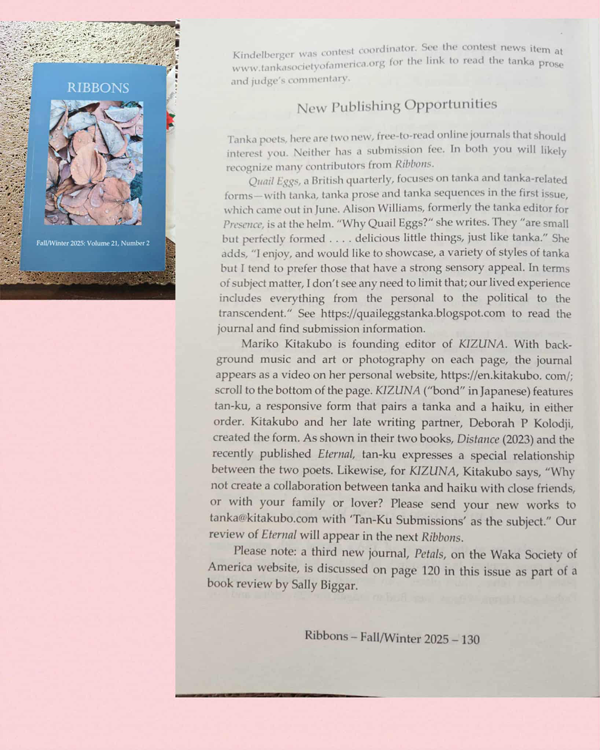
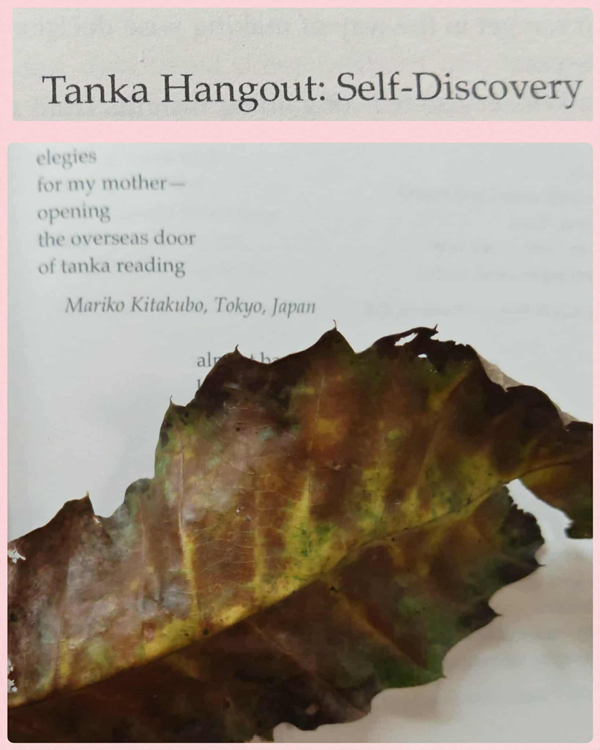
Tanka Hangout: Self-Discovery
elegies
for my mother -
opening
the overseas door
on tanka reading
Mariko Kitakubo, Tokyo, Japan
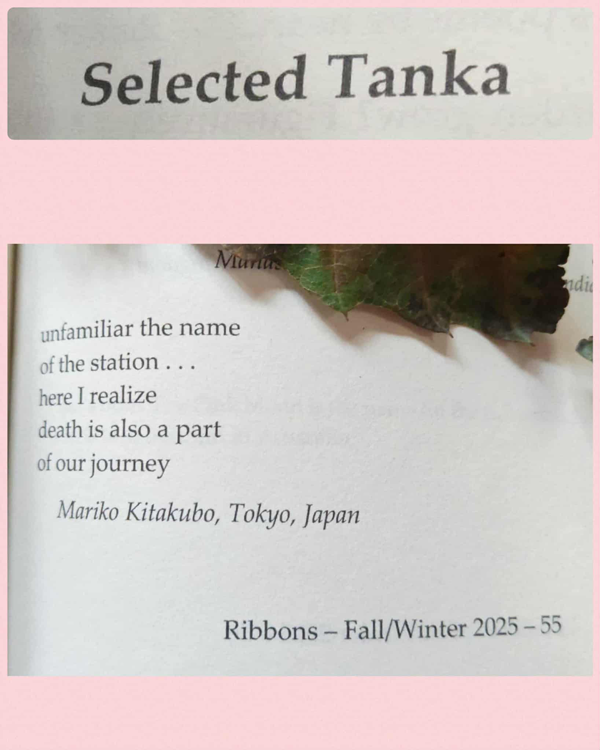
Selected Tanka
unfamiliar the name
of the station ...
here I realize
death is also a part
of our journey
Mariko Kitakubo, Tokyo, Japan
The following Tanka Sequence "Lament" was published in TSA Ribbons Spring/Summer 2025:Vol 21 No.1 along with an introduction to the Tan-Ku Online Magazine KIZUNA.
I would like to express my sincere gratitude to the editor, Susan Weaver, for devoting her precious space to it. Thank you very much.
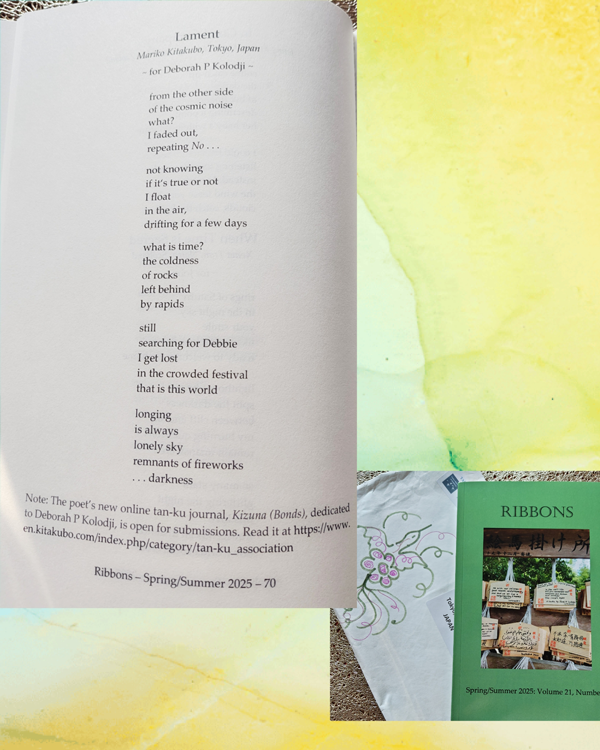
Lament
Mariko Kitakubo, Tokyo, Japan
- for Deborah P Kolodji -
from the other side
of the cosmic noise
what?
I faded out,
repeating No..
not knowing
if it's true or not
I float
in the air,
drifting for a few days
what is time?
the coldness
of rocks
left behind
by rapids
still
searching for Debbie
I get lost
in the crowded festival
that is this world
longing
is always
lonely sky
remnants of fireworks
...darkness
Note: The poet's new online tan-ku journal, Kizuna (Bonds), dedicated to Deborah P Kolodji, is open for submissions. Read it at https://www.en.kitakubo.com/index.php/category/tan-ku_association
Ribbons - Spring/Summer 2025 -70
The following work was published in the Tanka Hangout theme The Five Senses in TSA Ribbons Spring/Summer 2025:Vol 21 No.1.
I would like to express my sincere gratitude to the editor, Ken Slaughter.Thank you so much.
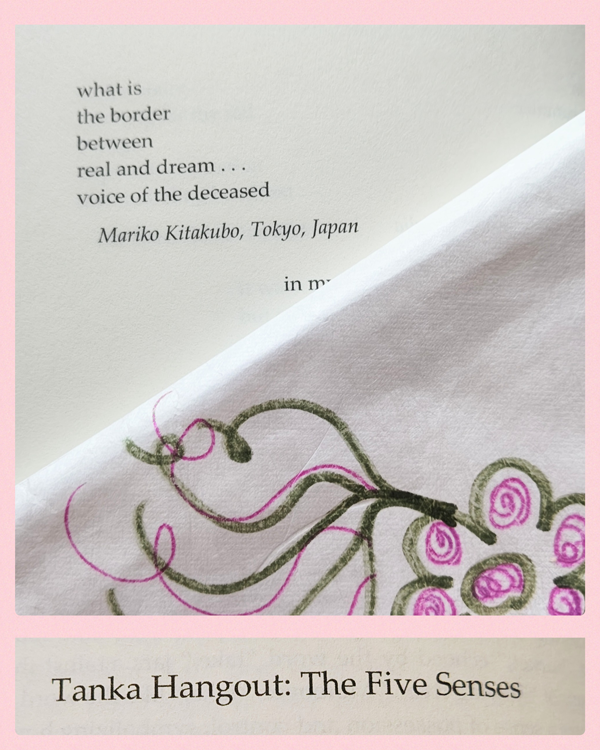
what is
the border
between
real and dream...
voice of the deceased
My works were appeared in the Fall/Winter issue of Ribbons, the magazine of the Tanka Society of America, in Selected Tanka and Tanka Hangout.
Thank you very much for giving me your valuable magazine.
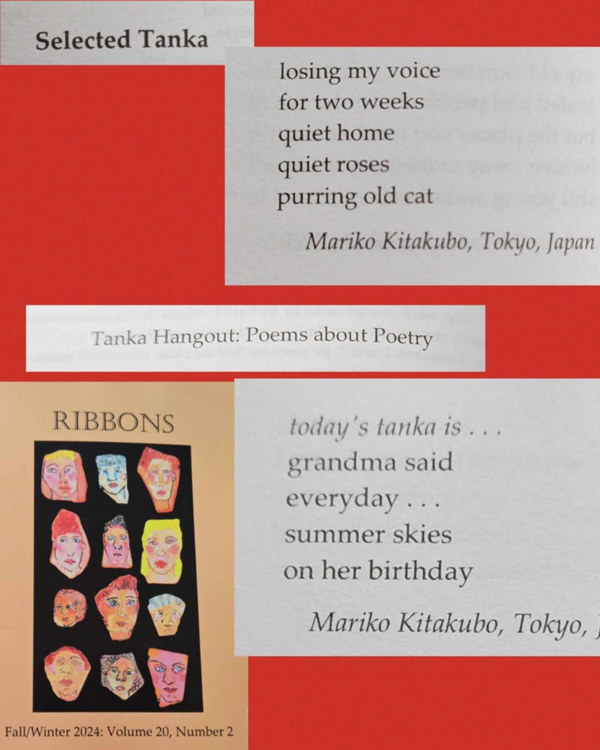
Selected Tanka
losing my voice
for two weeks
quiet home
quiet roses
purring old cat
Mariko Kitakubo, Tokyo, Japan
Tanka Hangout: Poems about Poetry
today's tanka is...
grandma said
everyday...
summer skies
on her birthday4
Mariko Kitakubo, Tokyo, Japan
Thank you so much TSA, for using my work for the 2023 Anthology.
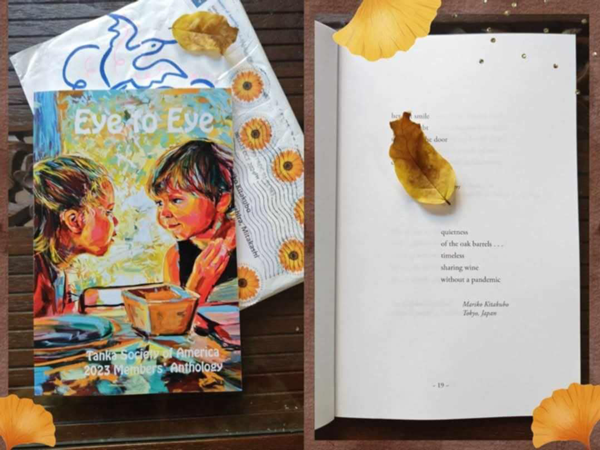
quietness
of the oak barrels...
timeless
sharing wine
without a pandemic
Mariko Kitakubo/Tokyo, Japan
I am pleased to report that my new English tanka has been published in TSA Ribbons Spring/Summer 2024 Vol.20 No.1 in its "Selected Tanka" and "Tanka Hangout: Relationships" sections.
Also, Ms. Peggy Hale Bilbro wrote a wonderful book review about "DISTANCE" in this editon.
Thank you very much.
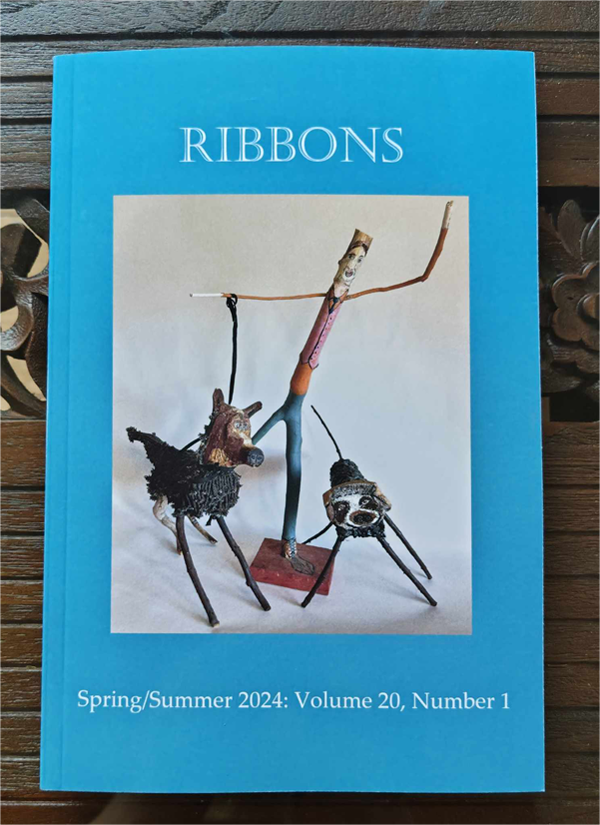
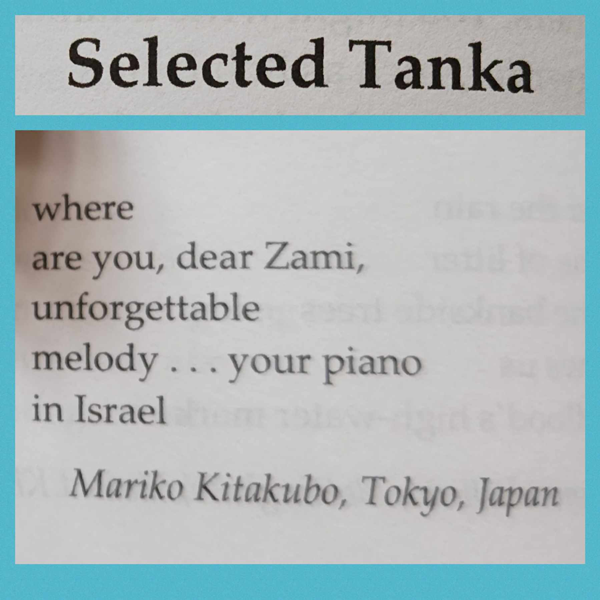
Selected Tanka
where
are you, dear Zami,
unforgettable
melody ... your piano
in Israel
Mariko Kitakubo, Tokyo, Japan
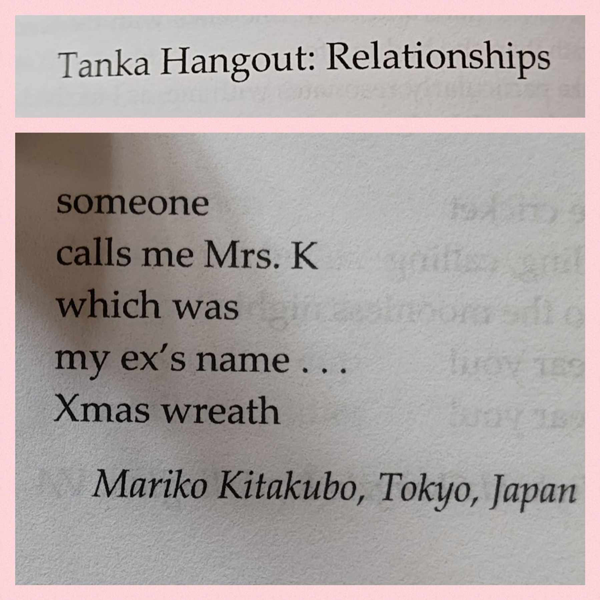
Tanka Hangout: Theme: Relationships
someone
calls me Mrs. K
which was
my ex's name ...
Xmas wreath
Mariko Kitakubo, Tokyo, Japan

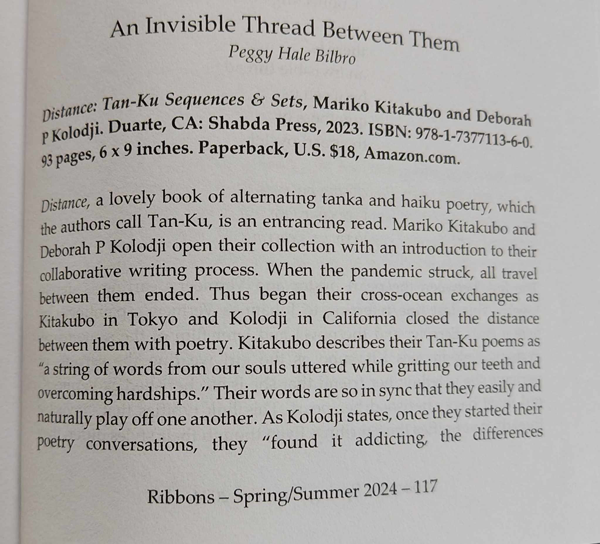
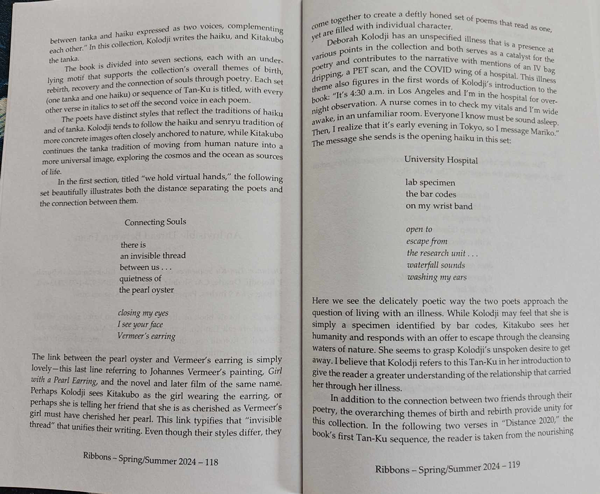
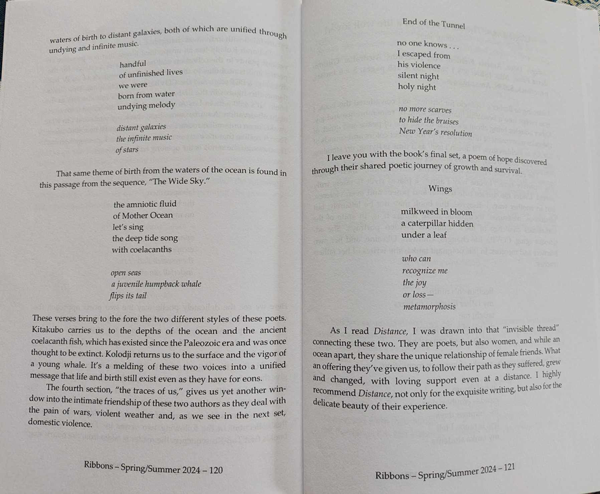
An Invisible Thread Between Them
Peggy Hale Bilbro
Distance: Tan-Ku Sequences & Sets, Mariko Kitakubo and Deborah P Kolodji. Duarte, CA: Shabda Press, 2023. ISBN: 978-1-7377113-6-0. 93 pages, 6 x 9 inches. Paperback, U.S. $18, Amazon.com.
Distance, a lovely book of alternating tanka and haiku poetry, which the authors call Tan-Ku, is an entrancing read. Mariko Kitakubo and Deborah P Kolodji open their collection with an introduction to their collaborative writing process. When the pandemic struck, all travel between them ended. Thus began their cross-ocean exchanges as Kitakubo in Tokyo and Kolodji in California closed the distance between them with poetry. Kitakubo describes their Tan-Ku poems as "a string of words from our souls uttered while gritting our teeth and overcoming hardships." Their words are so in sync that they easily and naturally play off one another. As Kolodji states, once they started their poetry conversations, they "found it addicting, the differences between tanka and haiku expressed as two voices, complementing each other." In this collection, Kolodji writes the haiku, and Kitakubo the tanka.
The book is divided into seven sections, each with an underlying motif that supports the collection's overall themes of birth, rebirth, recovery and the connection of souls through poetry. Each set (one tanka and one haiku) or sequence of Tan-Ku is titled, with every other verse in italics to set off the second voice in each poem.
The poets have distinct styles that reflect the traditions of haiku and of tanka. Kolodji tends to follow the haiku and senryu tradition of more concrete images often closely anchored to nature, while Kitakubo continues the tanka tradition of moving from human nature into a more universal image, exploring the cosmos and the ocean as sources of life.
In the first section, titled "we hold virtual hands," the following set beautifully illustrates both the distance separating the poets and the connection between them.
Connecting Souls
there is
an invisible thread
between us ...
quietness of
the pearl oyster
closing my eyes
I see your face
Vermeer's earring
The link between the pearl oyster and Vermeer's earring is simply lovely-this last line referring to Johannes Vermeer's painting, Girl with a Pearl Earring, and the novel and later film of the same name. Perhaps Kolodji sees Kitakubo as the girl wearing the earring, or perhaps she is telling her friend that she is as cherished as Vermeer's girl must have cherished her pearl. This link typifies that "invisible thread" that unifies their writing. Even though their styles differ, they come together to create a deftly honed set of poems that read as one, yet are filled with individual character.
Deborah Kolodji has an unspecified illness that is a presence at various points in the collection and both serves as a catalyst for the poetry and contributes to the narrative with mentions of an IV bag dripping, a PET scan, and the COVID wing of a hospital. This illness theme also figures in the first words of Kolodji's introduction to the book: "It's 4:30 a.m. in Los Angeles and I'm in the hospital for overnight observation. A nurse comes in to check my vitals and I'm wide awake, in an unfamiliar room. Everyone I know must be sound asleep. Then, I realize that it's early evening in Tokyo, so I message Mariko." The message she sends is the opening haiku in this set:
University Hospital
lab specimen
the bar codes
on my wrist band
open to
escape from
the research unit …
waterfall sounds
washing my ears
Here we see the delicately poetic way the two poets approach the question of living with an illness. While Kolodji may feel that she is simply a specimen identified by bar codes, Kitakubo sees her humanity and responds with an offer to escape through the cleansing waters of nature. She seems to grasp Kolodji's unspoken desire to get away. I believe that Kolodji refers to this Tan-Ku in her introduction to give the reader a greater understanding of the relationship that carried her through her illness.
In addition to the connection between two friends through their poetry, the overarching themes of birth and rebirth provide unity for this collection. In the following two verses in "Distance 2020," the book's first Tan-Ku sequence, the reader is taken from the nourishing waters of birth to distant galaxies, both of which are unified through undying and infinite music.
handful
of unfinished lives
we were
born from water
undying melody
distant galaxies
the infinite music
of stars
That same theme of birth from the waters of the ocean is found in this passage from the sequence, "The Wide Sky."
the amniotic fluid
of Mother Ocean
let's sing
the deep tide song
with coelacanths
open seas
a juvenile humpback whale
flips its tail
These verses bring to the fore the two different styles of these poets. Kitakubo carries us to the depths of the ocean and the ancient coelacanth fish, which has existed since the Paleozoic era and was once thought to be extinct. Kolodji returns us to the surface and the vigor of a young whale. It's a melding of these two voices into a unified message that life and birth still exist even as they have for eons.
The fourth section, "the traces of us," gives us yet another window into the intimate friendship of these two authors as they deal with the pain of wars, violent weather and, as we see in the next set, domestic violence.
End of the Tunnel
no one knows...
I escaped from
his violence
silent night
holy night
no more scarves
to hide the bruises
New Year's resolution
I leave you with the book's final set, a poem of hope discovered through their shared poetic journey of growth and survival.
Wings
milkweed in bloom
a caterpillar hidden
under a leaf
who can
recognize me
the joy
or loss ---
metamorphosis
As I read Distance, I was drawn into that "invisible thread" connecting these two. They are poets, but also women, and while an ocean apart, they share the unique relationship of female friends. What an offering they've given us, to follow their path as they suffered, grew and changed, with loving support even at a distance. I highly recommend Distance, not only for the exquisite writing, but also for the delicate beauty of their experience.
I am pleased to report that my work has been published in TSA Ribbons Fall 2023 Vol19 No.3.
I would like to express my sincere gratitude to Tanka Editor Ms. Susan Weaver for selecting my sequence from the many works of many members.
I would also like to thank Tanka Hangout Editor Mr. Ken Slaughter.
Thank you very much.
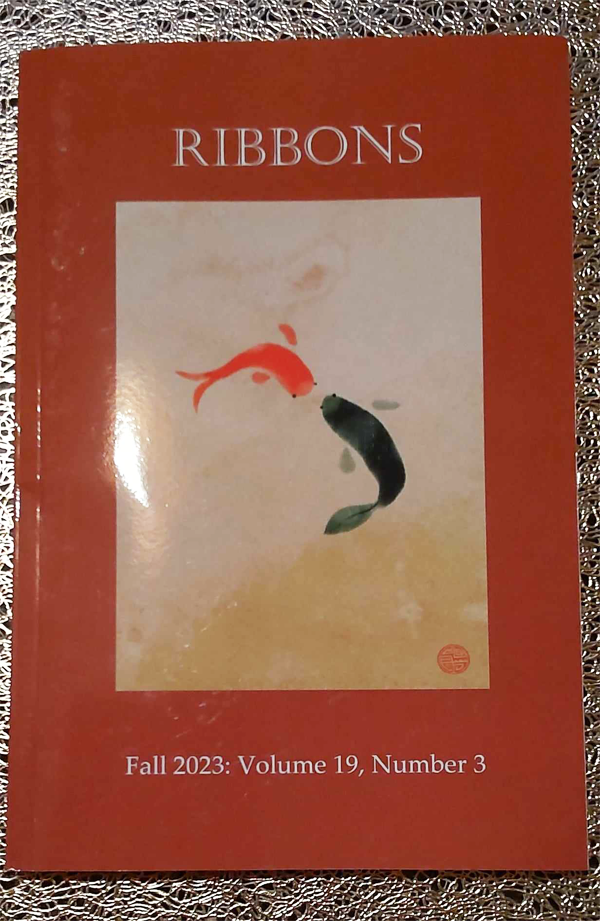
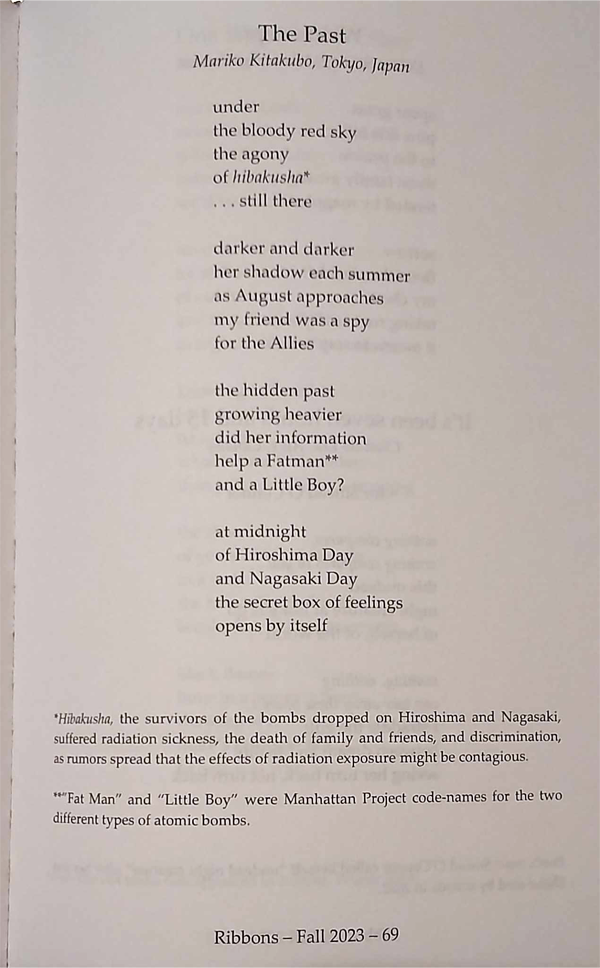
The Past
Mariko Kitakubo, Tokyo, Japan
under
the bloody red sky
the agony
of hibakusha*
...still there
darker and darker
her shadow each summer
as August approaches
my friend was a spy
for the Allies
the hidden past
growing heavier
did her information
help a Fatman**
and a Little Boy?
at midnight
of Hiroshima Day
and Nagasaki Day
the secret box of feelings
opens by itself
* "Hibakusha, the survivors of the bombs dropped on Hiroshima and Nagasaki, suffered radiation sickness, the death of family and friends, and discrimination, as rumors spread that the effects of radiation exposure might be contagious.
** "Fat Man" and "Little Boy" were Manhattan Project code-names for the two different types of atomic bombs.
Ribbons - Fall 2023 page 69

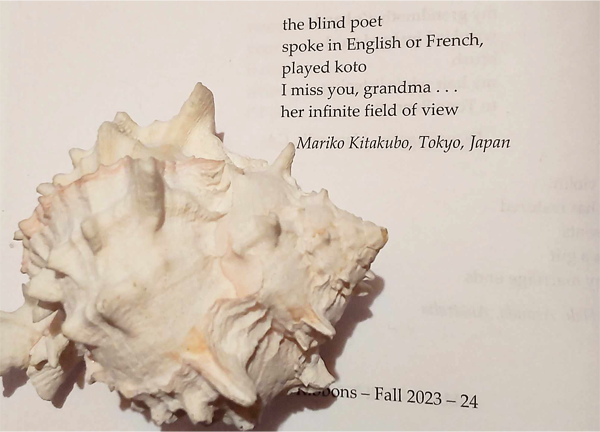
Tanka Hangout: Tribute Poems
the blind poet
spoke in English or French,
played koto
I miss you, grandma...
her infinite field of view
Mariko Kitakubo, Tokyo, Japan

...Some poets pay homage to family members. Mariko Kitakubo recalls her grandmother, who was a "blind poet." She played the koto, a traditional Japanese zither. ... by -Ken Slaughter
Ribbons - Fall 2023 page 13
Move to "Tanka Society of America"
My English tanka poem was published in the Tanka Society of America 2022 Members' Anthropology, "One Moment at a Time."
I express my sincere gratitude to Mr. Jim Chessing, the editor of the magazine, and to Ms. Kathabela Wilson for sending a copy via airmail to me.
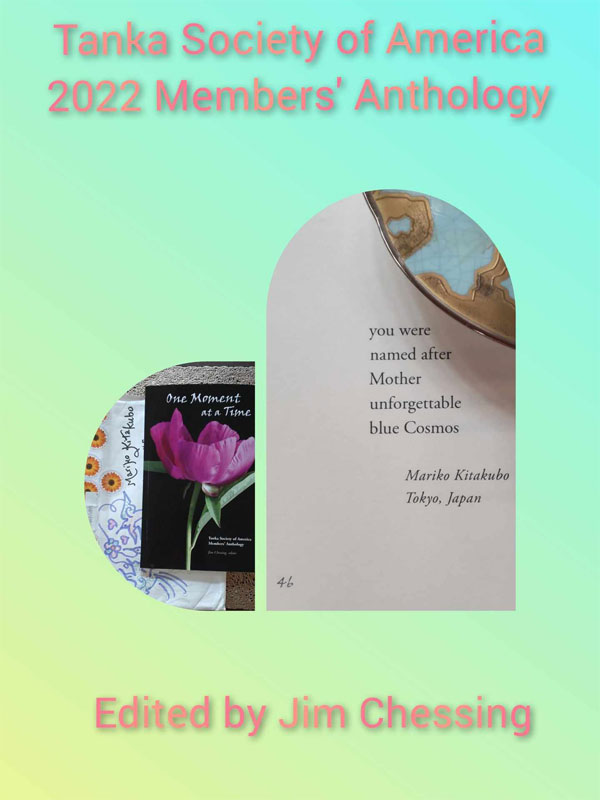
you were
named after
Mother
unforgettable
blue Cosmos
Move to "Tanka Society of America"
Dear Susan Weaver, The Ribbons Editor, and Ken Slaughter, Tanka Hangout Editor.
Thank you very much for choosing my works from among many members' works.
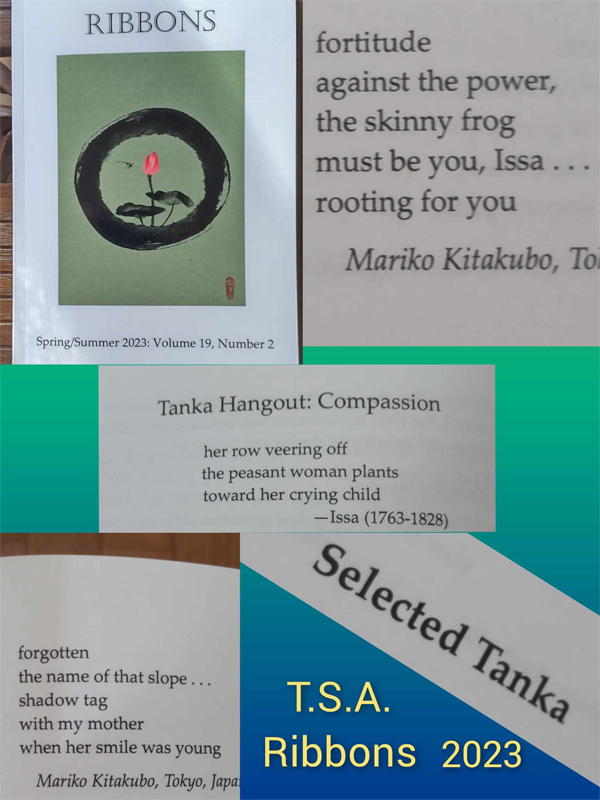
Tanka Hangout: Compassion
her row veering off
the peasant woman plants
tward her crying child
- Issa (1763-1828)
fortitude
against the power.
the skinny frog
must be you, Issa ...
rooting for you
Selected Tanka
forgotten
the name of that slope ...
shadow tag
with my mother
when her smile was young
Move to "Tanka Society of America"
TSA Ribbons Winter 2023: Vol 19, Number 1, published my works in its sections - Selected Tanka and Tanka Hangout (Theme: Music).
Thank you very much for choosing my works from among many members' works.
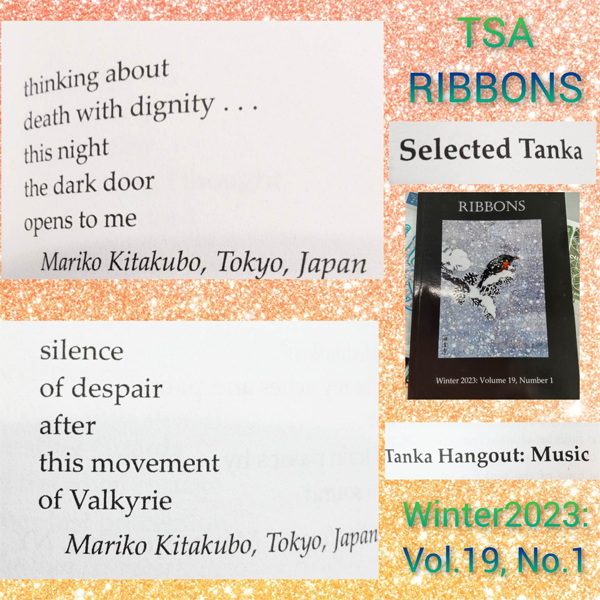
Selected Tanka
thinking about
death with dignity...
this night
the dark door
opens to me
Tanka Hangout: Music
silence
of despair
after
this movement
of Valkyrie
Move to "Tanka Society of America"
Ms. Autumn Noelle Hall,
Thank you so much for picking up my tanka for the Tanka Studio, TSA Ribbons Fall 2022: Vol. 18, Number 3.
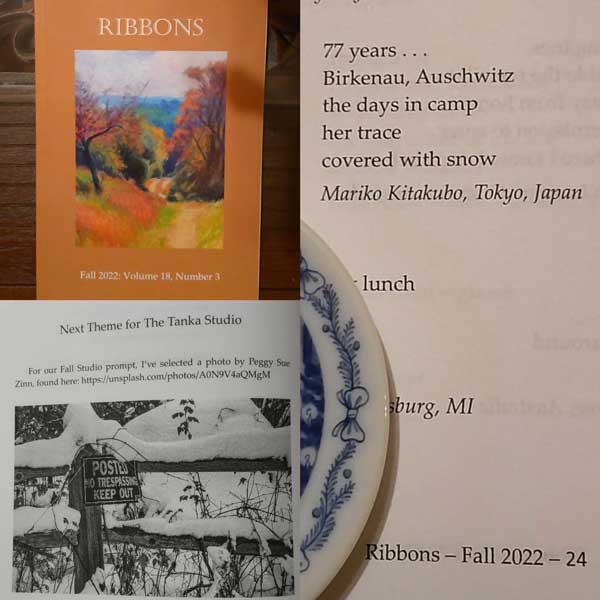
Tanka Studio
77 years...
Birkenau, Auschwitz
the days in camp
her trace
covered with snow
Move to "Tanka Society of America"
Thank you so much, Ms. Autumn Noelle Hall for using my tanka for "Tanka Studio'' about Ukraine.
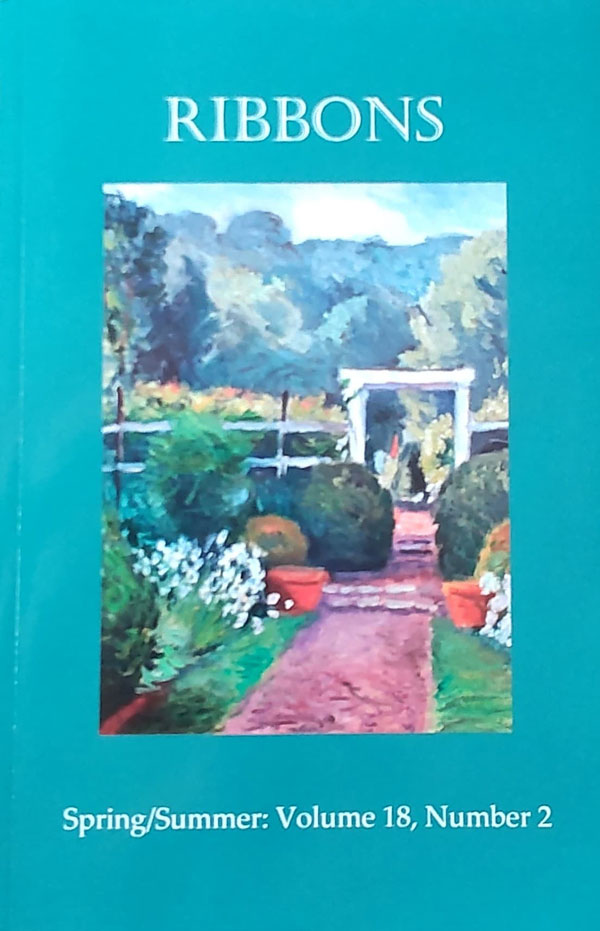
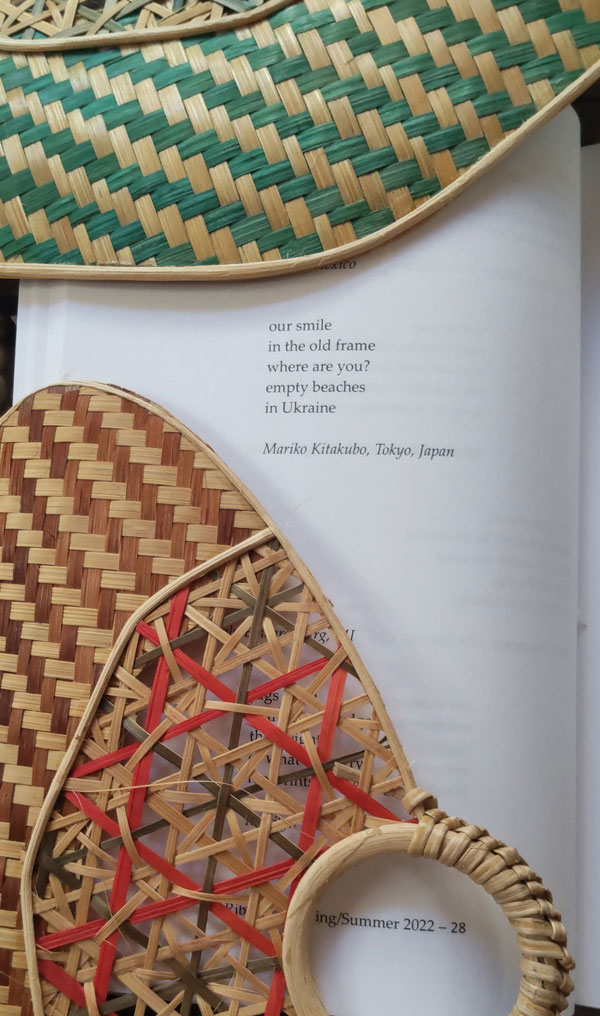
Tanka Studio: Ukraine
our smile
in the old frame
where are you?
empty beaches
in Ukraine
Move to "Tanka Society of America"
 Prev
Prev- Next

